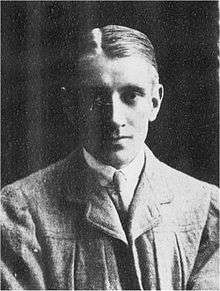Frederick Lonsdale

Frederick Lonsdale (5 February 1881 – 4 April 1954) was an English dramatist.
Personal life
Lonsdale was born Lionel Frederick Leonard in St Helier, Jersey, the son of Susan (née Belford) and John Henry Leonard, a tobacconist.[1][2] He began as a private soldier and worked for the London and South Western Railway. His daughters included Angela Worthington (who was born illegitimately, through his relationship with Muriel Rose Morice)[3][4] and his biographer Frances Donaldson, while his grandsons included the actors Edward Fox, James Fox, and the film producer Robert Fox.
Career

.jpg)
Frank Curzon produced the young Lonsdale's first work, the musical King of Cadonia (1908). Lonsdale's more substantial than usual dialogue for the show's Ruritanian comic opera plot won King of Cadonia fine notices and helped the musical to a long career. His next success was also for Curzon, The Balkan Princess (1910), which was little more than King of Cadonia with the sexes reversed, but it enjoyed a good London run and a long and wide provincial tour and foreign productions.
Lonsdale's next success was five years later, for George Edwardes, with Betty (1915). Following Edwardes's death, he submitted to Edwardes' executor, Robert Evett, a text that Curzon had rejected, The Maid of the Mountains (1917; revived in 1920), which became one of the phenomenally successful wartime shows in London, establishing itself as a classic of the British musical stage.
Lonsdale continued to write some musicals after the war. He adapted Booth Tarkington's Monsieur Beaucaire (1919, with music by André Messager) as a highly successful light opera and Jean Gilbert's Die Frau im Hermelin (1922, The Lady of the Rose) and Katja, die Tänzerin (1925), as well as Leo Fall's Madame Pompadour (1923). He also wrote the successful original book to the Parisian tale of The Street Singer for Phyllis Dare (1924) and Lady Mary (1928).
He also began to write straight comedies, and his plays included Aren't We All? (1923), Spring Cleaning (1925), The Last of Mrs. Cheyney (1925, which ran for 514 performances), On Approval (1927), Canaries Sometimes Sing (1929) and Let Them Eat Cake (aka Half a loaf) among others. His last play, The Way Things Go, was written in 1949, more than 40 years after his first stage work and five years before his death (in London) from a heart attack.
Selected filmography
Screenwriter
- The Private Life of Don Juan (1934)
Further reading
- Biography: Donaldson, F: Freddy Lonsdale (Heinemann, London, 1957)
References
- Aren't We all full text on internet archive
- Let them eat cake full text on internet archive
- The last of Mrs Cheney full text on gutenberg
- ↑ Modern British dramatists, 1900–1945 – Stanley Weintraub – Google Books. Retrieved 2013-08-05 – via Google Books.
- ↑ "Frederick Lonsdale Biography". BookRags.com. 2010-11-02. Retrieved 2013-08-05.
- ↑ "Featured Articles – Emilia Fox". TheGenealogist.co.uk. 1974-07-31. Retrieved 2013-08-05.
- ↑ Nick Barratt 12:01AM BST 26 May 2007 (2007-05-26). "Family detective". Telegraph. Retrieved 2013-08-05.
External links
- Works by or about Frederick Lonsdale at Internet Archive
- Biography of Lonsdale
- Frederick Lonsdale at the Internet Broadway Database

- "Profile of Lonsdale including information about his comedies". Archived from the original on 1 June 2004. Retrieved 2004-06-01.
- Frederick Lonsdale at the Internet Movie Database